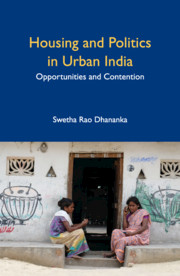Book contents
- Frontmatter
- Dedication
- Contents
- List of Figures
- List of Tables and Box
- Acknowledgements
- List of Abbreviations
- 1 Claiming Adequate Housing in Urban India: An Introduction
- 2 Indian Democracy: Normative Prescriptions and Everyday Practices
- 3 Governmentality of Housing and the Politics of Access
- 4 Mobilization on Behalf of the Urban Poor
- 5 Mobilizations by the Urban Poor
- 6 Claiming Housing despite Indian Politics and Governance
- Epilogue
- Bibliography
- Index
3 - Governmentality of Housing and the Politics of Access
Published online by Cambridge University Press: 30 April 2020
- Frontmatter
- Dedication
- Contents
- List of Figures
- List of Tables and Box
- Acknowledgements
- List of Abbreviations
- 1 Claiming Adequate Housing in Urban India: An Introduction
- 2 Indian Democracy: Normative Prescriptions and Everyday Practices
- 3 Governmentality of Housing and the Politics of Access
- 4 Mobilization on Behalf of the Urban Poor
- 5 Mobilizations by the Urban Poor
- 6 Claiming Housing despite Indian Politics and Governance
- Epilogue
- Bibliography
- Index
Summary
The expression of India’s awareness of the urban age was embodied by the launch of the Jawaharlal Nehru National Urban Renewal Mission (JNNURM) by the prime minister of India on 3 December 2005 in New Delhi. The prime minister’s speech started with the observation that in India an increasing share of its population now lived in urban areas, against the long-held myth that ‘India lived in its villages’ as long cherished by the Mahatma himself.The need to invest was justified by the rapid urbanization that has ‘not only outpaced infrastructure development, but has also brought in its train a terrible downside – the downside of proliferating slums, the downside of increasing homelessness, the downside of growing urban poverty and crime, of relentless march of pollution and ecological damage’. Within the second paragraph, he enumerated all the factors to convince India that a ‘massive challenge’ lay ahead. The need for renewal was also argued recognizing the fact that the urban economy ‘has become an important driver of economic growth. It also bridges between the domestic economy and the global market’. In regard to the urban poor, the statement was made that urban governance hadfailed to address the needs of the urban poor and that they had to be made ‘increasingly bankable’. At least from the prime minister’s speech these were the principle objectives of the mission and he went on to present some of its novel components. In his speech he described India’s urbanization process exhibiting two unaligned developments: cities being the main pillars for the positive economic development and cities being also the source of vulnerabilityfor their citizens due to slums and infrastructure pressures. So, this mission was about bringing the economic, social, and physical development in line with today’s exigencies of a ‘world-class city’ with the means of making funds available from the Centre on conditions that a list of reforms would be implemented by state governments.
- Type
- Chapter
- Information
- Housing and Politics in Urban IndiaOpportunities and Contention, pp. 69 - 95Publisher: Cambridge University PressPrint publication year: 2020



